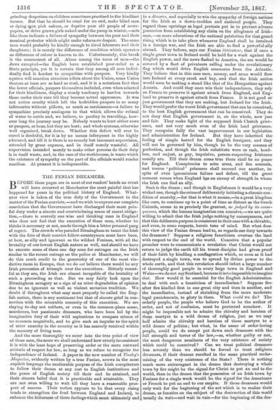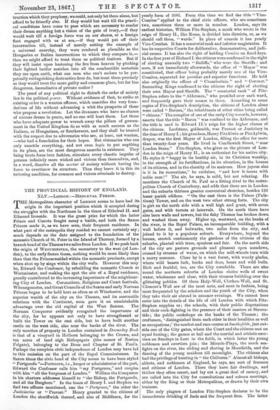THE FENIAN DREA NIERS.
BEFORE these pages are in most of our readers' hands an event will have occurred at Manchester the most painful that has happened for years in the political history of England. What- ever view is taken of the true duty of the Government in the matter of the Fenian convicts,—and we wish to express our complete conviction that the Government have discharged their most pain- ful duty under a sincere and overwhelming sense of moral obliga- tion,—there is scarcely one wise and thinking man in England who does not feel that the execution of these men, whether he thinks it necessary or not, sends through him a bitter personal pang of regret. The crowds who paraded Birmingham to taunt the Irish with the fate of their convict fellow-countrymen must have been, at best, as silly and ignorant as the wildest Feniaus, with all the brutality of our lowest English nature as well, and should we have to execute some of them one day soon for outrages on the Irish similar to the recent outrage on the police at Manchester, we will do this much credit to the generosity of one of the most vin- dictive races in Europe, that we do not believe there would be any Irish procession of triumph over the executions. Bitterly resent- ful as they are, the Irish are almost incapable of the brutality of such a proceeding as that. But we may fairly look upon the Birmingham savagery as a sign of an utter degradation of opinion due to an ignorant as well as violent sectarian tradition. We doubt if throughout what may most properly be called the Eng- lish nation, there is any sentiment but that of sincere grief in con- nection with the miserable necessity of this execution. We are slaying to-day not robbers, or even in the common-place sense, murderers, but passionate dreamers, who have been led by the imaginative fury of their wild aspirations to compass crimes of no common magnitude, and to give such an impulse to the spirit of utter anarchy in the country as it has scarcely received within the memory of living men.
And the more thoroughly we enter into the true point of view a these men, the more we shall understand how utterly inconsistent it is with the least hope of preserving order or the mere outward attitude of respect for law, so long as we refuse to recognize the independence of Ireland. A paper in the new number of Tinsley's Magazine, evidently written by a true Fenian, avows in the most explicit language the unalterable purpose of the Irish conspirators to follow their dream at any cost to English institutions and the peace of English society till their end be attained, and their sincere belief that it is practicable and attainable. They are not .even willing to wait till they have a reasonable pros- pect of success. Their notion appears to be that every rising tends to strengthen the feud between England and Irelanci, to enhance the bitternesa of those feelings which must ultimately end
_
in a divorce, and especially to win the sympathy of foreign nations for the Irish as a down-trodden and enslaved people. They regard these uprisings as legal protests put in to prevent adverse, possession from establishing any claim on the allegiance of Irish- men,—as mere educations of the national patriotism for that grand rising which is to take place whenever England shall be involved in a foreign war, and the Irish are able to find a powerful ally abroad. They believe, says our Fenian littirateur, that if once a single great town in Ireland could be held for a week against the English power, and the news flashed to America, the sea would be covered by a fleet of privateers sailing under the revolutionary flag which would drive English commerce from the Atlantic. They believe that in this case men, money, and arms would flow into Ireland at every creek and bay, and that the Irish nation would soon be making a stand like that of the Hungarians against Austria. And could they once win their independence, they rely on France to preserve it against attack from England, and Eng- land to preserve it against attack from France. It is not good or- just government that they are se-king, but Ireland for the Irish. They would prefer the worst Irish government that can be conceived,. to the best English government that can be conceived. They do. not deny that English government is, on the whole, now just and fair. They make light of the supposed Irish Church griev- ance, and not very much even of the Irish land grievance. They recognize fully the vast improvement in our legislation. and administration for Ireland. But they have inherited the feeling of simple hatred for the English foreigner, and they will not be governed by him, though he be the very essence of perfection, and though the Irish substitute were as rash, heed- less, and unjust, as gay, impulsive, person-respecting Irishmen, usually are. Till their dream come true there shall be no peace- for England. Conspiracies to seize arms, and fire arsenals, and rescue 'political' prisoners shall succeed one another, in spite of even ignominious failure and defeat, till the greab. moment comes when England hp an enemy of strength in whom, the Irish can find an ally.
Such is the dream ; and though in Englishmen it would be a very wicked one, though the crime of deliberately initiating a chronic con- dition of anarchy,—for that is what it means,—in a great kingdom like ours, to continue up to a point of time as distant as the Greek Calends, seems to us precisely the greatest, as judged by its conse- quences, which the human imagination can conceive,—we are quite- willing to admit that the Irish judge nothing by consequences, and that this deliberate purpose is consistent in their case-with a chivalric, and even, in some respects, heroic tone of mind. But what does- this view of the Fenian dream lead to, as regards our duty towards- the dreamers? Suppose a religious fanaticism overran the land, with respect to the end of the world. Conceive that a popular- preacher were to communicate a revelation that Christ would not; return to judge the earth till his truest disciples had given proof of their faith by kindling a conflagration which, so soon as it had' destroyed a single town, was to spread by divine power to the- whole earth, and that this revelation should infect a large number- of thoroughly good people in every large town in England and- Wales—we do not say Scotland, because it is too impossible to imagine- that. How would it be essential for the English Administration- to deal with such a fanaticism of incendiarism? Suppose fire- after fire kindled first in one great city and then in another, and the incendiaries, instead of shrinking from the more moderate- legal punishments, to glory in them. What could we do? The- orderly people, the people who believe God to be the author of order, and not of confusion, must be protected somehow. It might be impossible not to admire the chivalry and heroism of these martyrs to a wild dream of religion, just as we may half admire the chivalry and heroism of these martyrs to a wild dream of politics; but what, in the name of order-loving people, could we do except put down such dreamers with the, full strength and terror of the law,—as, whether guilty or not, the most dangerous assailants of the very existence of society which could be conceived? Can we treat political dreamers- less severely than we should be forced to treat religion.% dreamers, if their dreams resulted in the same practical under- mining of the very existence of the State? There is nothing much more extravagant in the dream that destroying a whole town by fire might be the signal for Christ to put an end to the world, than in the dream that the possession of an Irish town by Feniana for a single week would be the signal for the Americans or French to put an end to our empire. If these dreamers would only wait for the beginning of the act which is to realize their dream, as fanatics on the subject of the destruction of this world usually do wait—and wait in vain—for the beginning of the des-
Unction which they prophesy, we could, not only let them alone, but afford to be friendly also. If they would but wait till the practi- cal conditions have come to pass which are necessary to render their dream anything but a vision of the gate of ivory,—if they would wait till a foreign force was on our shores, or a foreign fleet engaged with us at sea,—if they would put off their insurrection till, instead of merely setting the example of a universal anarchy, they were rendered as plausible as the Hungarian or Italian insurrections to which they compare it,— then we might afford to treat them as political traitors. But if they will insist upon hastening the fire from heaven by pitching their lighted lucifer matches into all the combustible materials they see upon earth, what can men who can't endure to be per- petually extinguishing destructive fires do, but treat them precisely as they would treat the more guilty and common-place, but far less dangerous, incendiaries of private malice ?
The proof of any political right to disturb the order of society lies in the political power. Without evidence of that, to strike at existing order is a wanton offence, which unsettles the very foun- dations of life without advancing a whit the prospects of those who propose a revolution. Let the dreamers who have no chance of success dream in peace, and no one will hurt them. Let those who have adequate power to wrench away the pillars of govern- ment in the United Kingdom do so with as much success as the Italians, or Hungarians, or Southerners, and they shall be treated with the respect due to adversaries who are, at least, not wanton, —who had a foundation for their hopes. But visionaries who can only unsettle everything, and not even begin to put anything in its place, are the most dangerous anarchs in existence. They bring brute force into fashion, stimulate every chaotic impulse of persons infinitely more wicked and vicious than themselves, and, in a word, dissolve all the mortar of society without having the force to overthrow its structure. Then they leave it in this its tottering condition, for common and vicious criminals to destroy.



































 Previous page
Previous page